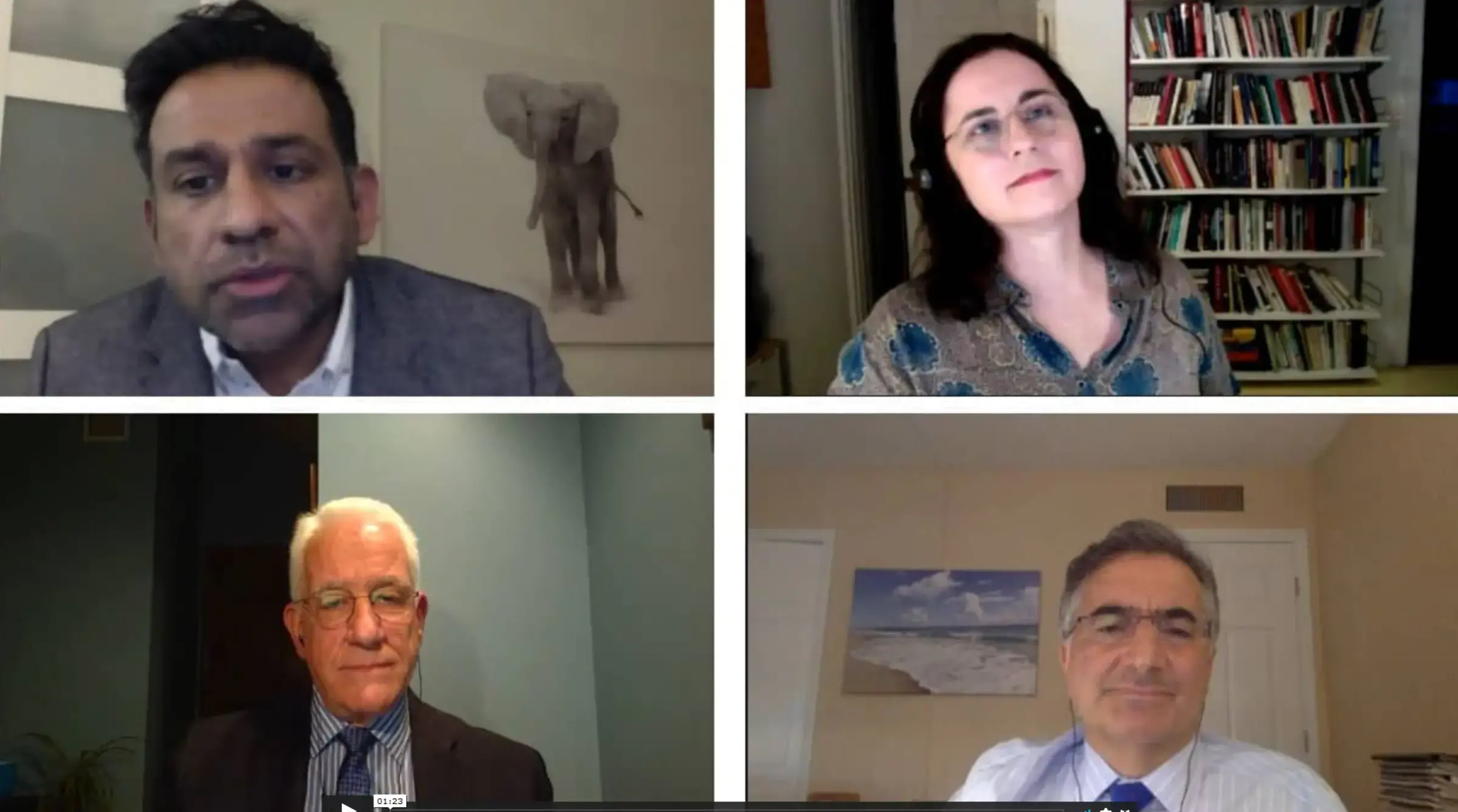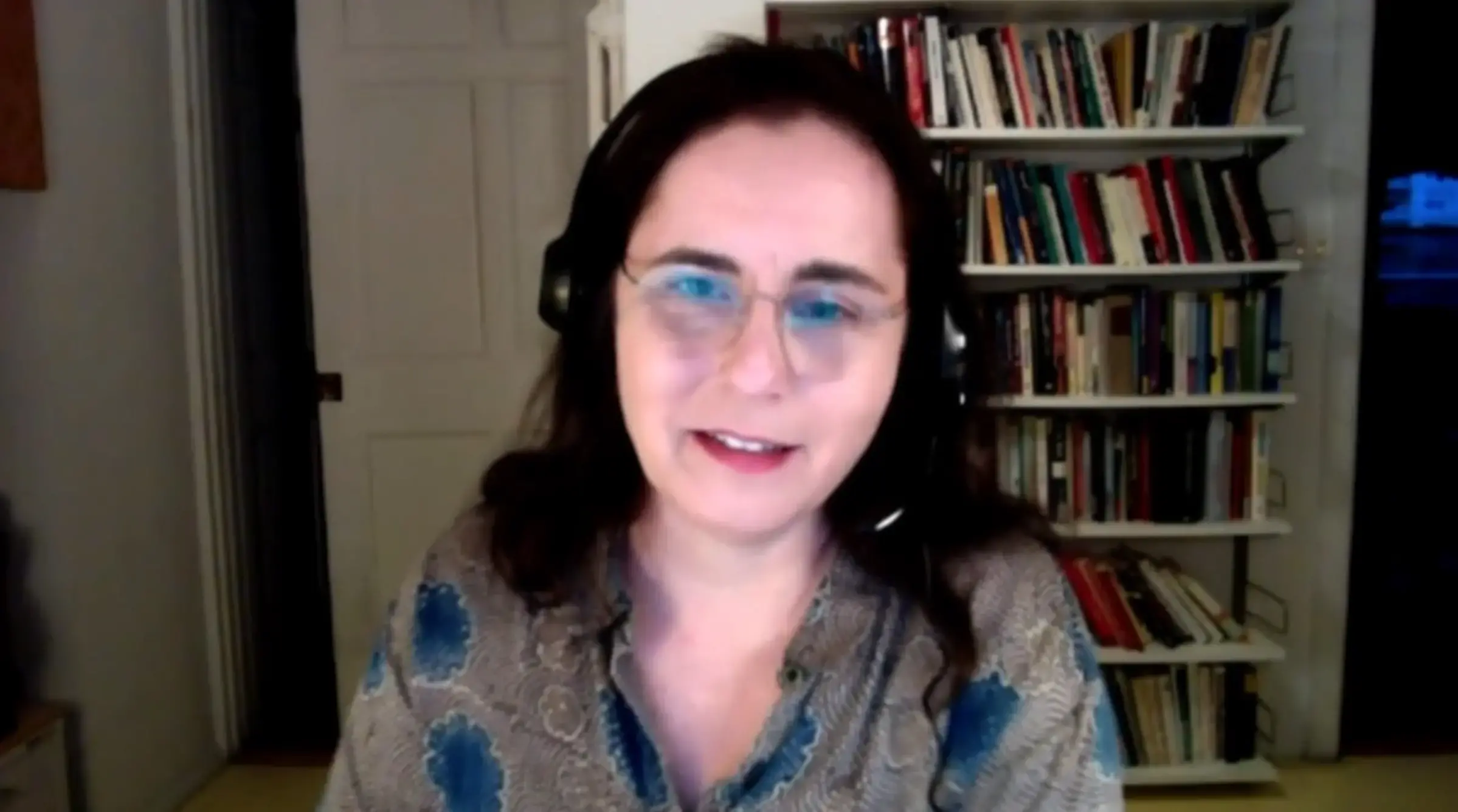A little more than a year ago, Sameer Ladha, J.D., Deputy Academic Director of Columbia’s Bioethics M.S. program, would turn to the news to learn the latest statistics about the newly-declared pandemic. But in May 2020, he learned that he had COVID-19. The diagnosis immediately and dramatically changed his perspective; he went from “looking from the outside in” to “looking from the inside out.”
“Every time I turned on the news, everything I had been interested in learning about, I no longer wanted to hear. Being on the inside, the news made me anxious. I was hoping for the best, but expecting it could get a lot worse. I kept wondering ‘what can I do?’ And then I realized, there’s nothing I could do. That made the whole experience alienating.”
Being a carrier heightened Ladha’s awareness of socio-economic and ethical issues associated with the pandemic and kicked off an important conversation about the intersection of Bioethics, Narrative Medicine, and Applied Analytics. On March 24th, as part of the Frame Your Future event series, the Columbia University School of Professional Studies convened a panel of business leaders and alumni from each program to revisit the pandemic and provide insights on how leaders could have eased the pain by combining the three disciplines, ultimately lessening the confusion, allowing for better decision-making and building trust in institutions and medicine.
“Our track record when it comes to equity during a crisis is not always good,” Ladha said. “People with power and resources are often at the front of the line. Also, the lack of data around COVID contributed to a changing narrative that failed to build trust.”
Our track record when it comes to equity during a crisis is not always good. People with power and resources are often at the front of the line. Also, the lack of data around COVID contributed to a changing narrative that failed to build trust."
Sameer Ladha, J.D., Deputy Academic Director, Bioethics
Building Trust: “You can only present a data set in a way where it can also be understood as a narrative.”
On the question of how data and narrative are intrinsically intertwined, Danielle Spencer, Ph.D., Academic Director of the Narrative Medicine M.S. program at Columbia, explained the discipline with a story. “A clinician faced with a patient must be a skilled translator. The patient is not just a set of organ systems, but a human being with the need to understand the condition, treatment plan, potential risks, and course of the disease."
“Many agree,” she said, “that there is a lack of humanity in our current healthcare system. And it affects clinicians and patients alike. The field was created to work alongside medicine, and it has advanced a lot. Today, it’s a trans-disciplinary field where questions arise such as: Who is the narrator? Who gets to tell the story?"
“Throughout the pandemic,” Spencer added, “there have been competing narratives across the US and the globe, and that has caused people to lose trust in what they’re hearing—especially when the ‘experts’ contradict each other. Even the CDC changed its own recommendation on mask wearing. You want to convince people,” she said, “to get vaccinated for safety reasons. But if you are hearing stories and they keep changing, then your trust is going to erode dramatically, and I think that’s what happened.”
Spencer concluded, “Once you bring in the framework of narrative, it can be extremely useful. From a perspective of data, narrative, and ethics, you cannot separate them from each other. For instance, Sameer shared his experience of having COVID last Spring. In conventional terms, is the recounting of that story an anecdote, or is it data? It’s actually outstanding data about his experience."
“Some would say narrative is when we talk about individuals, emotions, and 'subjective' experience. And data is when we talk about replicability, particularly in big data. But there is a fundamental reciprocity—that narrative and data are not distinct. In fact, you can only present a data set in a way where it can also be understood as a narrative. So, any narrative is going to structure what you’re talking about. Sameer told his story in a certain way, it had a certain structure, left certain things out. If told in a different way, it would have a different impact.”
From a perspective of data, narrative, and ethics, you cannot separate them from each other. For instance, Sameer shared his experience of having COVID last Spring. In conventional terms, is the recounting of that story an anecdote or is it data? It’s actually outstanding data about his experience."
Danielle Spencer, Ph.D., Academic Director, Narrative Medicine
How data and narrative can address questions about ethics in healthcare
Robert Klitzman, M.D., Program Director of Columbia’s Bioethics M.S. program, elaborated. “Today,” he said, “data, narrative, and ethics are all closely intertwined. Ethics plays a critical role in a pandemic because we have the narrative around the disease, we have data that provides insights, and ethics poses the question, ‘Now what do we do?’ With vaccines, for instance, there are a slew of questions.” Dr. Klitzman called out a few:
- Who should get vaccinated?
- What if someone doesn’t want to get the vaccination?
- What if someone works in a hospital and says, "I’m an anti-vaxxer?"
- What if someone is resistant because they feel the vaccine was rushed through production?
Having the data and the narrative allows us to proceed ethically to answer these questions, and come up with responses that are best for the culture. Dr. Klitzman added, “So, we now are seeing the data, hearing the narratives, and understanding the ethics involved with the decisions. The synchronicity between these elements is crucial, and the COVID pandemic is making that evident.”
Effectively communicating data can build trust and move people from belief to evidence
David Kreutter, Ph.D., Associate Director and Senior Lecturer in Columbia’s M.S. in Applied Analytics program, spoke on the crucial role data played in developing the vaccines, but he stressed the need for tying in a narrative grounded in fact.
“We need to view Analytics in the broader context,” he said, “not in isolation. During crises, we use these tools to explore solutions, experiment, and make hypotheses. We observe behaviors and then analyze the data. In fact, this is how the COVID vaccines were developed.” Data alone, though, cannot create the narrative. Kreutter added, “The data shows the results of the clinical trials, the FDA review processes for the vaccines, and the completeness of both, but the data does not illuminate if and why people may believe that those processes were rushed, let alone if they were rushed for political reasons.”
Confidence in the vaccine has multiple layers. There’s the safety of the vaccine itself, the trust in the manufacturers and government regulatory agencies, and the trust in the process of administering the vaccine. Some of these can be viewed quantitatively, but some cannot. Therefore, the question of “why” has to be probed more holistically.
“It still requires analytical thinking,” Kreutter added, “but the ‘why’ is not addressed algorithmically. We need to do algorithmic analysis, and we need to communicate with people that we can understand and help to address their fears and concerns. In order to be trusted, the narrative must be coherent.”
Moving forward
All of the panelists saw hope for the future. When Narrative Medicine intersects with Applied Analytics and Bioethics, the powerful combination carries with it unbiased truth and can help to restore the trust we lose while going through a crisis. Such an integrated approach is the ultimate grounding force in the narrative and also serves to establish the ethics that ultimately determine how we move forward.




